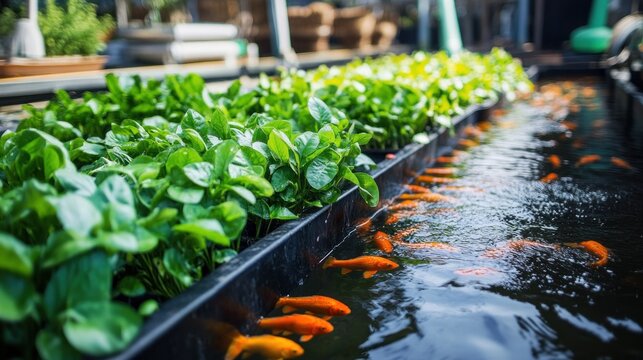Aquaponics is a system that merges aquaculture—which is the farming of aquatic animals in controlled water environments—and hydroponics, which is the growing of plants without soil, using nutrient-rich water instead.
It involves fish and vegetables growing symbiotically within the same loop.
In this closed cycle, water from fish tanks rich in organic waste circulates to plants that feed on the nutrients; in return, the plants purify the water before it flows back to the fish.
The process eliminates the need for soil, saves enormous amounts of water, and ensures that nothing goes to waste.
Studies estimate that aquaponics systems use up to 90% less water than conventional farming, while yielding both vegetables and fish from the same unit.
In Nigeria, aquaponics was developed by researchers as a small-scale experiment to tackle land and water scarcity.
It has since evolved into a promising alternative for smallholders, urban growers and agri-entrepreneurs seeking efficient, climate-resilient methods of production.
The nation’s growing urbanisation and land pressure make this technology even more relevant: aquaponics thrives in spaces as compact as rooftops, backyards, or repurposed warehouses. The combination technique maximises productivity per square metre while minimising environmental footprint.
The principle requires that fish waste provides natural fertiliser for plants; plants in turn filter and recycle the water, creating a clean environment for the fish.
The result is a natural ecosystem that continuously renews itself.
Water wastage is almost nonexistent, fertiliser costs drop sharply and farmers achieve year-round production even in regions vulnerable to drought or erratic rainfall.
Because the system is closed, there is little or no leaching of chemicals into the soil or groundwater, reducing environmental pollution and preserving biodiversity.
Since more attention is turning to this sustainable practice, a new wave of projects is introducing farmers to the design, installation and operation of aquaponics systems.
In Oyo State, a recent capacity-building programme brought together farmers from even Lagos to learn the practical techniques behind the method.
The training covered every aspect: from system setup and maintenance to managing the water cycle and ensuring optimal conditions for both fish and plants.
It marked another milestone in Nigeria’s gradual embrace of environmentally friendly, technology-driven agriculture.
The logic behind this drive is to offer a pathway to food security in a nation struggling with rising food prices, erratic weather patterns and a growing population as it produces two forms of food in one system.
Because it can operate in non-arable or urban areas, it addresses the challenge of limited farmland.
For Lagos, a densely populated state where agricultural land is increasingly converted to real estate, the technology could be transformative.
For Oyo, it expands possibilities for youth and smallholder farmers to diversify income through modern agribusiness.
The climate benefits are similarly significant. Aquaponics eliminates the heavy water consumption associated with traditional irrigation and curbs the excessive use of chemical fertilisers that contribute to soil degradation and greenhouse gas emissions.
The system’s natural filtration process improves water efficiency and protects surrounding ecosystems from nutrient pollution.
In an increasingly warming world, a self-contained system that recycles resources offers real defence against droughts and other climate threats.
However, setting up an aquaponics unit requires higher capital compared with planting in soil. Tanks, pumps, filters and power sources can be expensive, and the technology demands technical know-how to keep the delicate balance between fish and plants.
A power outage or water imbalance can disrupt the entire cycle. Access to spare parts, consistent energy supply and technical support, however, are crucial for long-term operation.
Despite the efficiency of aquaponics, market readiness is key: farmers must have reliable access to consumers for both fish and vegetables to make the venture profitable.
Nevertheless, aquaponics promises a leap from extractive to regenerative agriculture as it conserves resources rather than deplete them.
If more Nigerian farmers acquire the skills to deploy it, communities will gain cleaner environments, more resilient food systems and better livelihoods.
Summary not available at this time.






